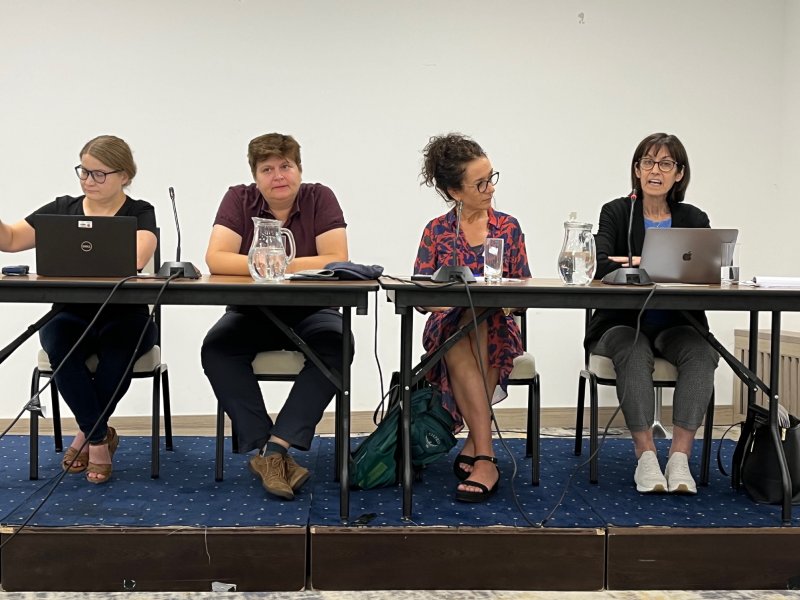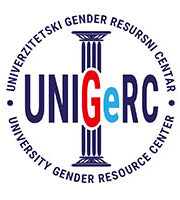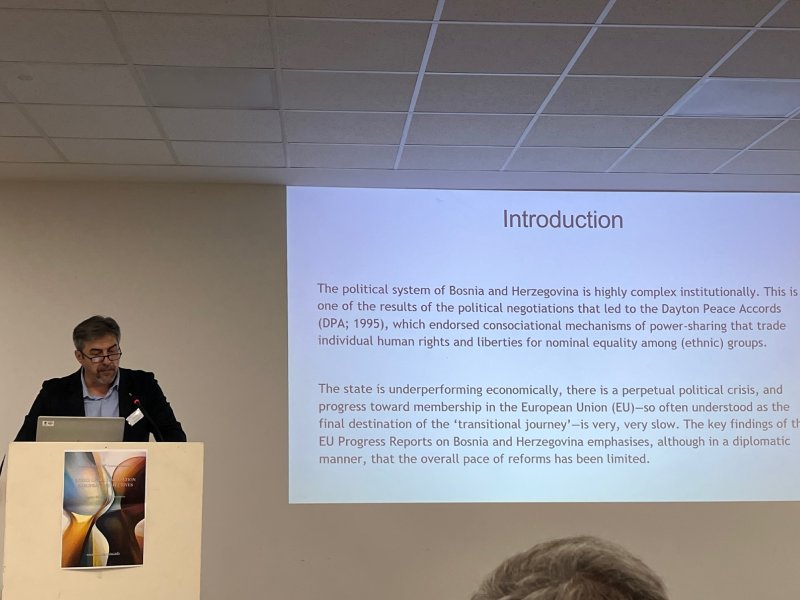The conference “Ethics of Reconciliation – European Perspectives” was held in Sarajevo from August 24th until August 27th, 2023. The conference was organized by Societas Ethica from Uppsala in cooperation with the Catholic Theological Faculty of the University of Sarajevo and the Center for Human Rights of the University of Sarajevo, with the support of the Renovabis association. The conference brought together about fifty scientists from Europe, America, and India. They have provided a view of the phenomenon of reconciliation from the point of view of various scientific disciplines, including theology, philosophy, and sociology. At the same time, they shared practical experiences from the arduous process of overcoming divisions and the legacy of the past, from the Republic of South Africa, Germany, Colombia, but also from the Balkans.
On behalf of the University of Sarajevo, the guests and participants of the conference were greeted by Vice-chancellor Dušanka Bošković, who emphasized the importance of this partnership and the recognition of Sarajevo, not only as a place of suffering but also as a place of hope and space for building a model of reconciliation as a pledge for the future. Professors from the University of Sarajevo took an active part in the work of the conference as lecturers and panelists: Professor Dino Abazović Ph.D. held one of the introductory lectures on “Political Reconciliation: Illustration of Bosnia and Herzegovina”. According to Professor Abazović, since the end of the war, society is in a gap between the concepts of retributive and restorative justice; dealing with the past is made difficult by policies of denial and seeing the conflict primarily through the prism of conflicting narratives based on oral history. Ethno-political and religious elites have a key influence on the dynamics of the reconciliation process, which is often instrumentalized for daily political purposes and to achieve short-term, narrow goals.
The second introductory lecture was given by Professor Zilka Spahić Šiljak Ph.D. entitled “En-gendering Reconciliation in the Balkans”. In her lecture, she focused on the feminist principles of ethics of care and ethics of justice, which complement each other. An ethic of justice can be cruel without care, and an ethic of care can be oppressive without justice. In feminist approaches to justice, it is important to speak against misogyny, and androcentrism, but also to constantly question the status quo in which there is no change or progress. The ethics of care is important not only in building peace but also in international politics, but as philosophers Nell Noddings and Fiona Robinson point out, the ethics of care require a relational ontology, i.e. insights into the concrete lives of people and their needs, and in all of this the experiences of victims and survivors are important in theoretical and practical approaches to reconciliation.
On the 24th of August Professor Zilka Spahić Šiljak Ph.D. also held a workshop with doctoral students from Western European countries who deal with the ethical dimensions of peacebuilding and reconciliation. The workshop was an introduction to the conference and aimed to bring male and female students closer to the context of the Balkans in which victims who have survived, especially those who survived wartime rapes, are often marginalized and silenced by different policies and ideologies. Ethno-national ideologies adhere to a conspiracy of silence, while various international donors and initiatives impose their agendas on survivors without the opportunity to position themselves, name the violence they suffered, and speak from their experience about ways to transform trauma and achieve peace and reconciliation. Students read texts from the book “Healing and Peacebuilding After War. Transforming Trauma in Bosnia and Herzegovina” edited by Julianne Funk and Nancy Good (2020). The texts talk about the agency of war rape survivors and their survival strategies and difficulties in reconciliation processes. Spahić stressed how body politics are extremely important both on an individual, social, and political level because women demand control over their bodies, lives, and experiences and not that someone always speaks on their behalf and that their experiences are used both politically and for other purposes.
Professor Zorica Maros Ph.D. spoke on the panel entitled “Theological resources and limitations in reconciliation in contemporary Europe” about the importance of memory and forgetting but in terms of active forgetting in the sense as Paul Ricour and Hanna Arendth position it. In addition, Professor Maros also spoke about the importance of justice for victims, because by insisting only on forgiveness, which is an integral part of Christian theology, we must not neglect the satisfaction of justice, which restores the dignity of a person who has suffered violence and loss.





